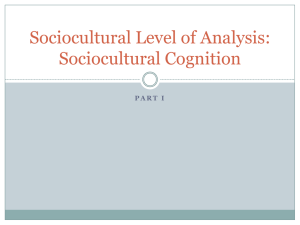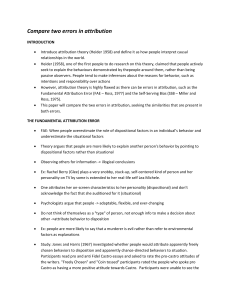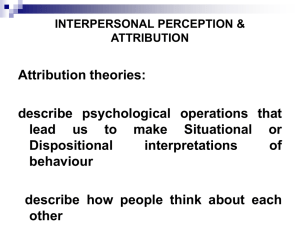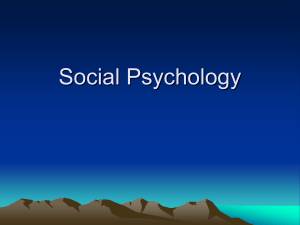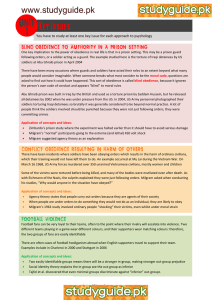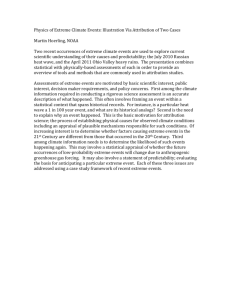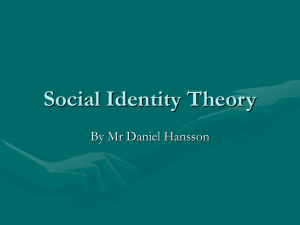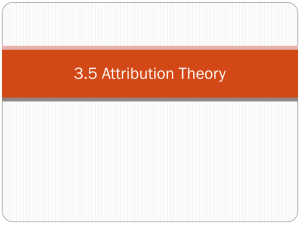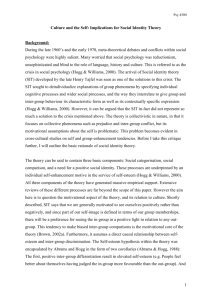Notecard SC
advertisement
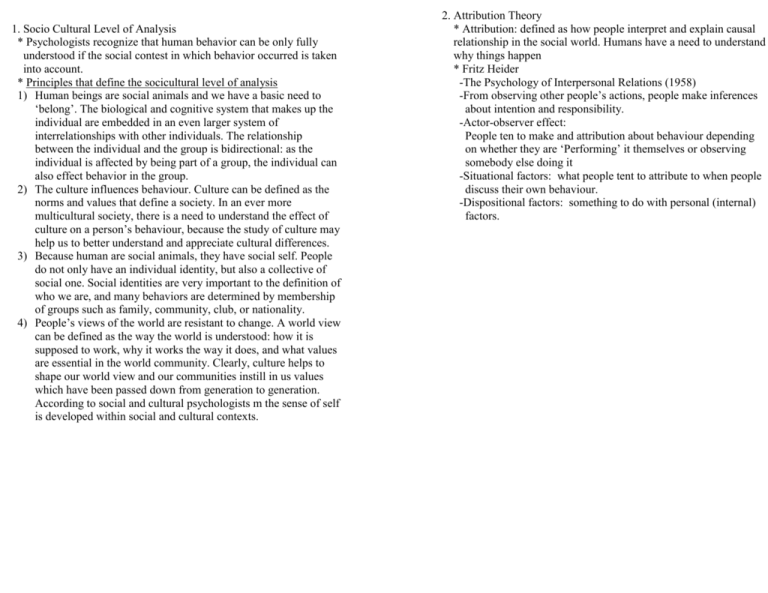
1. Socio Cultural Level of Analysis * Psychologists recognize that human behavior can be only fully understood if the social contest in which behavior occurred is taken into account. * Principles that define the socicultural level of analysis 1) Human beings are social animals and we have a basic need to ‘belong’. The biological and cognitive system that makes up the individual are embedded in an even larger system of interrelationships with other individuals. The relationship between the individual and the group is bidirectional: as the individual is affected by being part of a group, the individual can also effect behavior in the group. 2) The culture influences behaviour. Culture can be defined as the norms and values that define a society. In an ever more multicultural society, there is a need to understand the effect of culture on a person’s behaviour, because the study of culture may help us to better understand and appreciate cultural differences. 3) Because human are social animals, they have social self. People do not only have an individual identity, but also a collective of social one. Social identities are very important to the definition of who we are, and many behaviors are determined by membership of groups such as family, community, club, or nationality. 4) People’s views of the world are resistant to change. A world view can be defined as the way the world is understood: how it is supposed to work, why it works the way it does, and what values are essential in the world community. Clearly, culture helps to shape our world view and our communities instill in us values which have been passed down from generation to generation. According to social and cultural psychologists m the sense of self is developed within social and cultural contexts. 2. Attribution Theory * Attribution: defined as how people interpret and explain causal relationship in the social world. Humans have a need to understand why things happen * Fritz Heider -The Psychology of Interpersonal Relations (1958) -From observing other people’s actions, people make inferences about intention and responsibility. -Actor-observer effect: People ten to make and attribution about behaviour depending on whether they are ‘Performing’ it themselves or observing somebody else doing it -Situational factors: what people tent to attribute to when people discuss their own behaviour. -Dispositional factors: something to do with personal (internal) factors. 3. Errors in Attribution *Fundamental attribution error -When people overestimate the role of dispositional factors in an individual’s behaviour – and underestimate the situational factors. Since people gather information by observing others, this often leads to illogical conclusions. -Why is it common? Because people tend to thing of themselves as adaptable, flexible, and ever-changing human beings. They do not like to think of themselves as a ‘type’ person. However, when they look at others, they do not have enough information about them to make a balanced decision, so they attribute behaviour to disposition. When they consider their own behavior, they tend to think they would have acted differently under different circumstances. *Self-serving Bias (SSB) - People take credit for their successes, attribution them to dispositional factors, and dissociate themselves from their failures, attributing them to situational factor. - Lau and Russel (1980) American football coaches and players tend to credit their wins to internal factors – for example, being in good shape, the hard work they have put in, the natural talent of the team – and their failures to external factors – for example, injuries, weather, fouls committed by the other team. - Why is it common? Greenberg et al (1982) argue that the reason we do this is to protect our self-esteem. If we can attribute our success to dispositional factors, it booster our self-esteem, and if we can attribute our failures to factors beyond our control, we can protect our self-esteem. In other words, the SSB serves as means or self protections - Miller and Ross (1975) Cognitive factors plays role in SSB because we usually expect to succeed at a task. If we expect to succeed, and we do succeed, we attribute it to our skill and ability. If we expect to succeed and to not succeed, then we feel that it is bad luck or external factors that brought about his unexpected outcome. *Modest Bias & Culture differences -Kashima and Triandis (1986) Found significant difference between US and Japanese students. When asked to explain their performance on remembering different slides, the American tented to attribute their success to ability while the Japanese tended to explain their failures in terms of their lack of ability. -Collective nature of many Asian societies: if people derive their selfesteem not from individual accomplishment but from group identity they are less likely to use the SSB. 5.. Social Identity Theory Henri Tajfel * Assumes that individuals strive to improve their self-image by trying to enhance their self-esteem, base on their personal identity or various social identities. (people can boost their self-esteem through achievement or through affiliation with successful groups, and indicates the importance of social belonging) * Based on cognitive process of social categorization -explain social phenomena such as ethnocentrism, in-group favoritism, stereotyping, and conformity to in-group norms. *We categorize as in-group (us) and out-group (them) even when randomly assigned to a group *Self-esteem is contained by Social Comparison (the benefits of belonging to the in-group instead of the out-group) * Tajfel et al., 1974 - Boys randomly assigned to a group based on their preference for Klee or Kandindsky paintings rated the out-group as less-likeable even though the out-group members were never actually disliked - Group identity alone appears not to be responsible for intergroup conflict. In the absence of competition, social comparison does not necessarily produce a negative out come Cialdini et al. (1976) found college football supporters were more likely to represent their winning team by wearing team clothing and other insignia than when the team lost Bias to view group actions as positive because of our human need for a positive self-concept Further research has shown that group identity alone is not enough to produce intergroup conflict - there must be competition as well *Evaluation (+/-) (-)Describes but does not predict (-)There are situations where personal identity is stronger than the group identity (-)Theory on its own is reductionist because it ignores the interaction of the environment and the self (-)Think about cultural expectations, rewards as motivators, sense of belongingness, rewards used to motivate the in-group http://ibpsychrevision.blogspot.com/p/sociocultural-level.html 4. Research Methods at the Sociocultural level of analysis * The goal of the sociocultural research is to see how people interact with each other. It is important that the behavior of the participant is as realistic as possible, to avoid studies that lack ecological validity. Therefore, a significant amount of research is naturalistic. *Participant observation -researchers immerse themselves in a social setting for an extended period of time and observe behavior. -Overt observations >Requires researcher to gain the trust of the group that is to be observed. >
